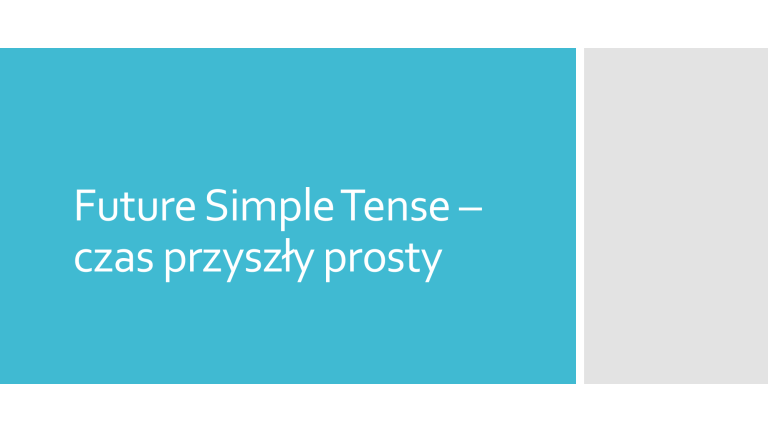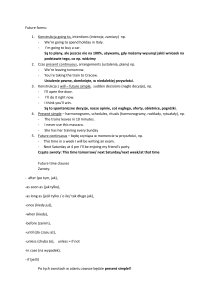
Future Simple Tense – czas przyszły prosty Czasu future simple używamy, gdy: mówimy o faktach w przyszłości np. We will have a test tomorrow. podejmujemy nagłą decyzję np. There aren’t any apples left. I will buy some after school. ZASTOSOWANIE obiecujemy coś np. This exercise is too difficult. Don’t worry, I will help you. prosimy o coś np. Will you check my homework? wyrażamy opinię dotyczącą przyszłych wydarzeń (używamy wtedy think lub be sure) np. I’m sure you will pass the test. Zdania twierdzące w czasie future simple tworzymy według wzoru: ZDANIA TWIERDZĄCE podmiot + will + czasownik (w formie podstawowej) np. Mike will get a new bike next week. They will visit their family tomorrow. ZDANIA PYTAJĄCE I KRÓTKIE ODPOWIEDZI Pytania w czasie future simple tworzymy według wzoru: will + podmiot + czasownik (w formie podstawowej) np. Will Mike get a new bike next week?Yes, he will. / No, he won’t. Will they visit their family tomorrow?Yes, they will. / No, they won’t. Zdania przeczące tworzymy według wzoru: podmiot + will + not + czasownik (w formie podstawowej) np. Mike will not get a new bike next week. ZDANIA PRZECZĄCE They will not visit their family tomorrow. UWAGA! Zamiast pełnej formy „will not” możemy użyć formy skróconej „won’t”. WILL + NOT = WON’T Uzupełnij zdania odpowiednią formą czasownika w nawiasie w czasie future simple: ĆWICZENIA 1. She ………… (walk the dog) while I’m at work. 2. ………………….. (they/ use) the new computer tomorrow? 3. I’m sure you ……………………. (learn) to swim quickly. 4. ……………….. (you/marry) me? Yes, I ……… . 5. Anna …………………. (not/go) to Italy next year. 6. I think people ……………………. (use) only electric cars in the future. 7. ……………….. (our team/win) the match? I’m sure they ……….. Źródła: - J. Heath, M.Crawford, podręcznik dla klasy 6 „Junior Explorer 6”, Wydawnictwo Nowa Era; - materiały i ćwiczenia własne.




